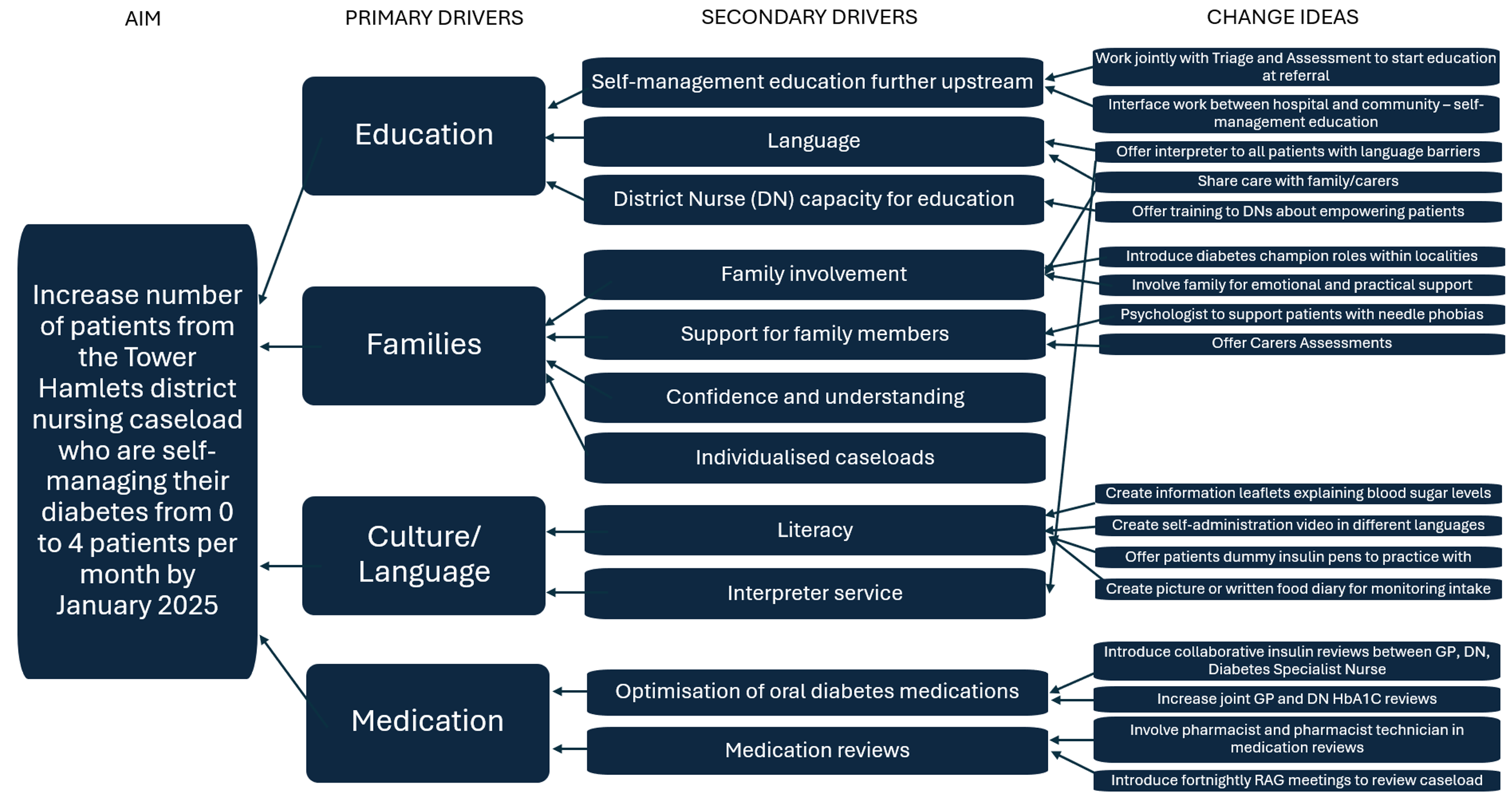
Promoting self-management for Tower Hamlets residents with diabetes: how my QI coach supported me
8th November 2024
Authors: Juliana Dike (Diabetes Specialist Nurse), Julie Archer (AHP Workforce Transformation Project Lead) and Clarissa Sorlie (Improvement Advisor)
Diabetes specialist nurse Juliana Dike has been promoting diabetes self-management for Tower Hamlets residents, with support from her Quality Improvement (QI) coach, Julie Archer.
Diabetes is a long-term condition that can go undiagnosed for many years and puts people at risk of complications such as heart attacks and strokes. The condition is managed through regular health checks, lifestyle modifications and, for some people, taking insulin to manage their blood sugar levels (Diabetes UK, 2023). For people who aren’t managing their insulin independently, this means relying on visits from district nurses, which can disrupt their daily routines and reduce their autonomy.
Juliana saw this situation and knew that she wanted to make improvements for both staff and patients in her directorate using a QI approach. However, she had never led a QI project before and didn’t know where to start.
Fortunately, every QI project in ELFT is allocated a QI coach to support them through the QI journey. Julie Archer, an occupational therapist and AHP Workforce Transformation Lead, joined the team as QI coach.

Figure 1. Juliana Dike (project lead) and Julie Archer (coach)
With Julie’s guidance, Juliana and her team developed a driver diagram to organise all her change ideas into a cohesive theory of change.
Figure 2. Driver diagram showing the team’s theory of change
The team then started systematically testing each change idea, with support from Julie to think through what questions she wanted to answer with each Plan Do Study Act (PDSA) cycle, and to identify her predictions so she could maximise her learning from each test. Throughout this process, Juliana provided the subject matter expertise into diabetes care and the system she works in, while Julie brought the knowledge of QI methodology and an outside perspective.
So far, Juliana and her team have tested a range of change ideas:
- Carrying out home visits to educate patients and/or family members in insulin administration
- Routinely identifying patients’ first language and booking an interpreter for insulin education sessions, if required
- Using dummy insulin pens to demonstrate how to administer insulin, and leaving these with patients/family members to practice with
- Identifying patients/family members who have the potential to self-administer insulin but are unable to administer due to a fear of needles, and referring them for psychological support
- Reviewing upcoming HbA1c reviews in locality meetings and liaising with GPs to ensure that all patients have up to date blood tests
- Introducing a Diabetes Champion role for band 5 nurses
The team are starting to see results. So far, they have helped 35 people to independently manage their insulin (see Figure 3). A further 10 families have now gained the skills and confidence to support their family members with insulin at evenings and weekends, which means that they rely on less visits from district nurses.

Figure 3. Run chart showing number of patients newly self-managing their diabetes per month
Richie is one of these patients now self-managing his insulin after having diabetes for 25 years: “I never thought I would be able to do this. Learning to do it myself has given me a lot of my independence back because I don’t have to wait for the nurses to come, as there was no fixed time for them to come. That was a great issue to be able to overcome. I am a happier person now; a lot of distress has gone away from me. I can get up in the morning and have it day by day because I have this great thing given to me.”
The support of a QI coach has enabled Juliana to progress this work for the benefit of patients, their families, and staff. “Having a QI coach has greatly improved my confidence and empowered me to continue with the QI project. Building a professional relationship based on mutual interest has been amazing; having a coach who had passion for coaching has been very helpful.”
Reflecting on her role as QI coach, Julie said, “As an occupational therapist, working towards independence is right up my street! It’s been my privilege to be a part of this project as the QI coach. Not only has it allowed me to use the skills acquired through ELFT’s Improvement Coaching Programme but to be involved in an area of work that has the potential to really make a difference to the lives and independence of patients and our nursing colleagues”.
References:
Diabetes UK (2023) ‘Type 2 Diabetes’. Available at: https://www.diabetes.org.uk/about-diabetes/type-2-diabetes (Accessed: 22 October 2024)
Update on 03.07.25: Click here to hear Juliana present this work at the Joint QI Forum (November 2024)
Most Read Stories
-
Why is Quality Control important?
18th July 2018

-
An Illustrated Guide to Quality Improvement
20th May 2019

-
2016 QI Conference Poster Presentations
22nd March 2016
-
Recognising Racism: Using QI to Help Take Action
21st January 2021

-
Using data enabled us to understand our problem
31st March 2023

-
QI Essentials: What does a Chief Quality Officer do?
18th March 2019


Follow QI on social media
To keep up to date on the latest concerning QI at ELFT, follow us on our socials.



